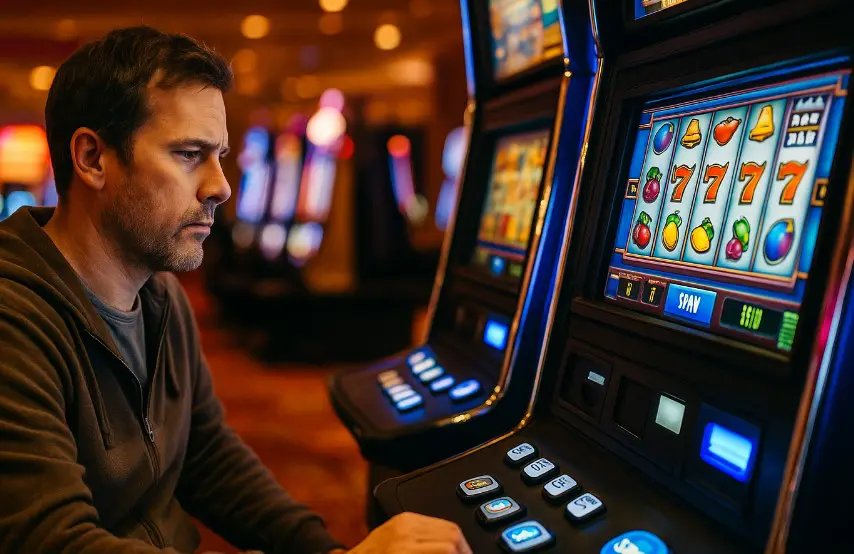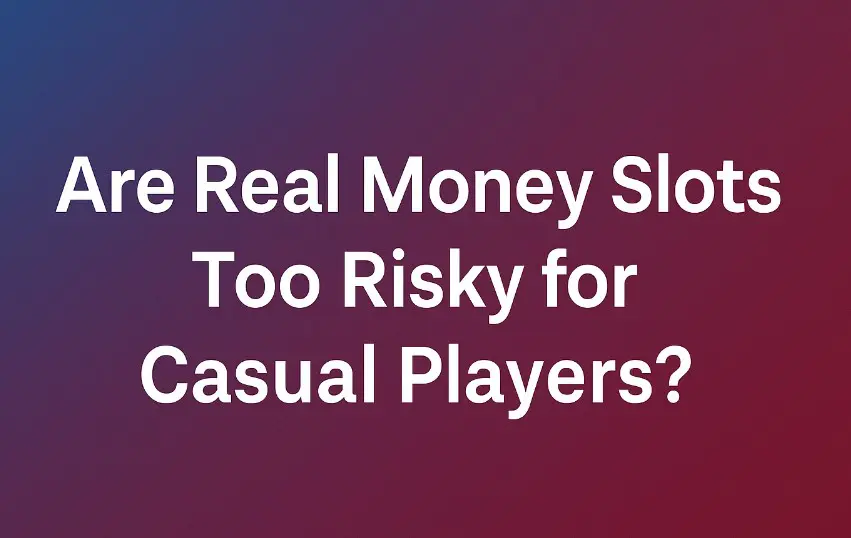Casinos, whether online or on the strip, have a way of pulling people in with their flashing screens and the promise that maybe, just maybe, you’ll hit something big. For casual players, real money slots look harmless—low stakes, easy rules, no intimidating table to sit at. But scratch the surface and you’ll find risks that aren’t always obvious until your wallet feels lighter.
What Makes Real Money Slots Appealing to Casual Players?
There’s a reason why the slot floor is the noisiest part of any casino. Bells, clinks, cheerful jingles—it feels like walking into a carnival where luck is the main attraction. Online, the same sensory overload is packed into a smartphone app.
I remember one friend saying her first night on a slot app felt like “having a little fireworks show in the background while folding laundry.” That’s the hook—it’s entertainment that doesn’t demand much attention. You can place a bet with a swipe, keep one eye on the reels, and still chat with friends or binge-watch a series.
Casual players like it because there’s no need to study odds charts or bluff anyone across the table. A couple of dollars here and there feels lighthearted, especially when the game tosses in small wins often enough to keep you smiling. The illusion of being “up” for the night can be strong, even when the balance says otherwise.
Key Risks Associated with Real Money Slot Play
The danger creeps in through that same ease. Slots don’t have strategy layers that reward skill over time. It’s pure chance wrapped in shiny graphics. That unpredictability makes them exciting, but it also means the house always edges ahead.
I once spoke with a neighbor who joked about “just spending coffee money” on slots. A few weeks later, he admitted that the “coffee money” had quietly grown into grocery money. That’s how slippery the slope can be. A streak of near-wins fuels the feeling that the jackpot is “around the corner.” Psychologists even have a term for it—the near-miss effect. Slot designers don’t stumble into this by accident; they build it into the experience.
And then there’s time. Hours can evaporate without you noticing. Casinos love that, of course, because the longer you spin, the more their edge plays out.
Financial and Privacy Concerns for New Gamblers
Losing a few spins hurts, but there’s more than just bankroll risk. Signing up for an online casino often means handing over your ID, your bank details, and sometimes even proof of address. On licensed sites, this is standard safety protocol. On shady ones, it can feel like handing your keys to a stranger.
There’s also the fine print. That “$100 free bonus” plastered across banners? It usually requires wagering thousands before you can touch it. I know someone who thought they’d scored a lucky win with bonus funds, only to discover they needed to gamble it through thirty times before being allowed a withdrawal. By the time they hit the playthrough, the winnings were long gone.
Withdrawal speed is another sore spot. A friend once said, “Depositing was like lightning, but cashing out was like waiting for Christmas.” Regulated casinos tend to process faster, while sketchier ones drag their feet, hoping you’ll cancel and gamble it back.
How Regulated Casinos Protect Players
Not every casino is a wild west saloon. Licensed sites operating under gambling authorities have to follow rules designed to stop the worst abuses. Many offer tools to cap deposits, limit session times, or even lock you out if you’ve had enough.
One player I met online mentioned he set up a daily limit before his first spin and said it “saved me from myself on bad days.” Those tools aren’t perfect, but they provide brakes when the fun starts to skid.
Regulated casinos are also required to keep player balances separate from business funds. So if the company goes under, your money doesn’t just vanish into bankruptcy court. It’s not bulletproof protection, but it’s a lot better than trusting some offshore site with no oversight.
Social Casinos vs. Real Money Slots: Safer Alternatives?
Social casinos—those free apps filled with credits instead of cash—scratch the same itch for flashing lights and satisfying spins. The risk isn’t your bank account, but your sense of time and, occasionally, your patience.
That said, they’re not completely innocent. Most of them sell virtual credits, and if you’re not careful, ten dollars here or there sneaks in. Still, for someone who enjoys the spectacle more than the payouts, they can be a safer path.
A cousin once told me, “Turns out I just liked the lights and sounds—I didn’t actually care if I won.” If you’re in that camp, social casinos might give you all the fun without the stress of chasing losses.
Responsible Gambling Tips for Slot Players

If you’re going to spin, you might as well make it sustainable. A few small habits go a long way:
- Decide your budget before you log in and treat it like a movie ticket—money for entertainment, not investment.
- Use the deposit limits or reminders most regulated sites provide.
- Never chase a loss; that’s how small setbacks turn into big dents.
- Keep gambling money separate from essentials—rent and groceries don’t belong in the same pot.
- Step away regularly. Even a ten-minute break can reset your perspective.
They sound obvious, but the truth is most people don’t apply them until they’ve already had a bad night.
Recognizing Problem Gambling and Getting Help
The shift from casual play to something darker often sneaks up. Maybe you start hiding your play from family, or maybe you get restless when you can’t log in. I’ve heard people describe feeling “itchy” when they’re not spinning, which is as telling as it sounds.
Borrowing to gamble is a giant red flag, as is feeling anxious or guilty after a session. The moment gambling stops being lighthearted, it’s worth pausing.
Support exists, whether through hotlines, online resources, or the self-exclusion tools built into regulated sites. Some casinos even prompt you with “cool-off” offers if your play patterns look risky. It’s not a cure-all, but it’s a start.
And a reminder worth repeating: gambling should never be a coping mechanism for stress, loneliness, or financial struggles. Once it fills those roles, the risks multiply fast.
Final Thoughts
Real money slots can absolutely be fun—quick, colorful, and sometimes even lucky. But for casual players, the trap is how easy it is to slide from “a few harmless spins” into hours lost and budgets blown. The smartest approach is treating them as entertainment, nothing more.
Stick with regulated casinos, lean on the tools they provide, and most importantly, know when to call it a night. At the end of the day, the reels aren’t designed for you to win long term. They’re designed for the casino to profit. That doesn’t mean you can’t enjoy them—it just means you need to keep your guard up.
FAQs on Real Money Slot Risks
Are real money slots safe for beginners?
They can be, as long as you pick licensed casinos and keep a budget. The danger isn’t in learning the game—it’s in losing track of limits.
What’s the biggest risk for casual slot players?
Financial loss. Small bets add up quicker than you think, especially when you play on impulse.
Can playing social slots prevent addiction?
They’re safer financially, but habits can still form. If you’re playing all day, the line between harmless and harmful gets thin.
Do VIP casino programs help or harm casual players?
They usually encourage higher spending. Unless you’ve got a big bankroll, they’re more likely to drain your wallet than help.
How can someone know if they have a gambling problem?
Signs include chasing losses, hiding play, or feeling anxious when not gambling. If that rings true, it’s worth talking to a professional or reaching out for support.


